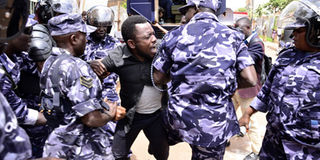Prime
Makerere riots are damaging image of the university

A man reacts after arrest during Makerere University students tuition protest on October 23, 2019. PHOTO BY ALEX ESAGALA
What you need to know:
The issue: Makerere strikes.
Our view: It is high time a lasting solution is sought to resolve these conflicts so that the university reverts to its core mandate, with a conducive environment to learn and do research.
Makerere University was this week a centre of violent protests where security and students clashed after the latter went on strike to protest against a 15 per cent tuition policy that was recently approved.
Rubber bullets and tear gas rocked the institution and the surrounding communities as police engaged in running battles with the students. Businesses in and around the university were compelled to close due to the strike, that also caused colossal losses.
The strike that lasted eight hours saw 33 students, including guild president Julius Kateregga, arrested for engaging in the protest. The situation there remained tense as students promised to continue with the strike until the tuition increment policy is suspended by the university management.
Protest and riots at Makerere University have become a norm and are now endemic, as they always pit university management against the students. One of the worst riots witnessed in 1990 left two students dead and several others injured.
Before and after 1990, there have been incessant strikes at Makerere that have become disruptive to the academic environment and the university and business community in its environs.
But the issue is, why have strikes persisted at the oldest highest institution of learning in the country? Scrutiny needs to be focused on finding out why different study groups and intakes at different times have staged strikes at this university.
Several reasons for this unrest have rotated around money, either student allowances or increment of tuition or both.
For a university plagued with unrest does not present itself as a good place for learning, research and devising ways of solving problems in the community. Because the university is preoccupied with dealing with and managing unrests away from its core role, the planners never get time to focus on developing modules that would make Makerere a repository of knowledge.
Fire begets fire, and when this violence is let to continue, and allowing the situation to get worse, a disaster is only awaiting as long as these run-ins persist yet the reasons for the recurrence of the strikes seem to remain a constant.
It is high time a lasting solution is sought to resolve these conflicts so that the university reverts to its core mandate, with a conducive environment to learn and do research.




